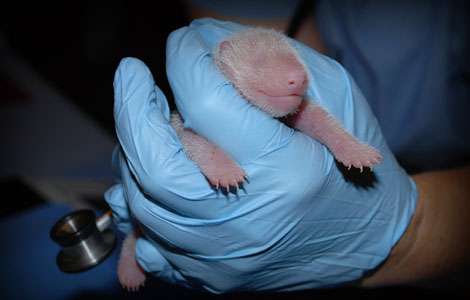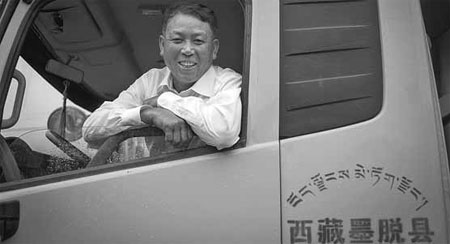New road a changing path to prosperity
Updated: 2013-08-27 06:51
By Liu Xiangrui and Daqiong (China Daily)
|
||||||||
|
Jikmey Dorje has witnessed how growing traffic enriches the life of Medog. |
Jikmey Dorje says no one knows better how roads can change a man's life than himself.
The 55-year-old has witnessed Medog's traffic evolve over the past few decades, from the meandering forest path to a horse road, a way for small tractors and now the new roadway. He has also become wealthy by closely monitoring such improvements.
Growing up in a village near Medog's county town, Jikmey had to help relieve the family burdens because of his mother's disability and his father's bad health. When he was 11, he started carrying home salt and other daily necessities on his back from outside the county, following other villagers. He would tote about 15 kilograms of salt at first, walking several days on the poor roads and climbing over snow-capped mountains.
"I cried many times on the way, because I was too young and I couldn't catch others," he recalls.
As he grew older and stronger, the burden on his back got heavier and heavier.
In the late 1980s, Medog had a horse track leading to the outside world, and teams of horses carrying goods were common.
Jikmey joined the horse-transport business. At first, he could only afford to buy a few horses, and often had to take the extra goods on his own back.
"I'd buy one more horse at a time with the money I saved," says Jikmey, who owned 12 horses by 1998. He hired fellow villagers as his assistants.
Each journey by horse took more than 10 days. The crew carried plastic sheet and cooking tools, and cut trees for simple shelters at night.
They tried to rest near grasslands for the horses. Sometimes humans had to take up the goods when a horse suddenly fell ill on the way, he says.
There were many risks traveling on such a road.
On their way, they had to cross Mount Duoxiongla, 4,500 meters high. Once Jikmey was caught in winter snow for two days due to a road blockade.
"I felt I was dying then," he says.
Horses of transport teams often fell off old, rotting wooden bridges into the river.
Though times were hard then, Jikmey says the experience along the way was valuable.
"I met a lot of new people and learnt things I'd never know when in Medog," he explains. "I'd carefully observe what others are doing and try to learn from them."
When hybrid rice was introduced to Medog in the 1990s, local farmers, who had never seen it before, were reluctant to take risks.
"They simply ate all the seeds provided free by the local government," Jikmey recalls. "But I had seen the hybrid rice and became the first farmer in my county to try planting it."
He had a great harvest, and all the local farmers started planting it in the next two or three years.
Like many others, Jikmey opened a small shop on the mountain roadside with four fellow villagers as traffic got busier.
It was a simple shack of plastic cloth, opened from July to December and closed during winter.
It sold limited goods such as cigarettes and instant noodles. But the shop could generate 5,000 yuan ($817) a year, which was a considerable income in Medog then.
In 2000, a new road allowing tractors was built. It connected the county and an important transfer station.
Jikmey soon bought one of the few tractors in Medog, as transport was still profitable work then.
He bought his first truck in 2011, soon after the roadway connecting Medog and the outside world was finally open. He has focused on transporting construction materials like concrete, seeing the county's growing need for it as traffic grows.
Now he owns two houses, five trucks, three cars and three excavators. He has started a small construction company and a factory of prefabrication panels, too. The transport business alone brings him about 500,000 yuan a year.
As the village head for 18 years, Jikmey formed a transport team of 30 trucks last year. The team often travels between Medog and nearby counties, delivering constructional materials, farm products, and daily goods. Many families have considerably improved their financial conditions this way.
Before 2011, every household in Medog had a quota for transporting necessary provisions. Each household needed to haul 300 kilograms.
With the horse team, his village was often able to help other villages and earn extra allowances provided by local governments, Jikmey recalls.
"But that was a hard way to earn money. Now we don't have to do it anymore," he says.
He says the growing traffic and economy has energized the atmosphere of local life. Instead of drinking and idling about along the streets, most young people can easily find sideline work beside farm season.
"People are working harder nowadays, because there are a lot of opportunities," Jikmey says. "I believe there will be more great changes in the future."
(China Daily USA 08/27/2013 page10)

 Chinese navy starts escort mission at Gulf of Aden
Chinese navy starts escort mission at Gulf of Aden
 McGrady retires, considers career in China
McGrady retires, considers career in China
 Li Na breezes into US Open second round
Li Na breezes into US Open second round
 China and India set to resume military drills
China and India set to resume military drills
 Dwight Howard, Kai Ko promote fitness in Beijing
Dwight Howard, Kai Ko promote fitness in Beijing
 DC panda cub doing well
DC panda cub doing well
 Muslim Brotherhood leaders, Mubarak face trial
Muslim Brotherhood leaders, Mubarak face trial
 Cliff diving in the city
Cliff diving in the city
Most Viewed
Editor's Picks

|

|

|

|

|

|
Today's Top News
Nation must adjust when US tapers QE
Prosecutors seek heavy punishment for Bo Xilai
Pet abuse videos prompt outrage
China joins anti-tax fraud effort
UN to contact US over spying report
Foreigners nabbed for personal info trafficking
PLA Navy heads for routine drill in W.Pacific
Antitrust 'not target' foreign firms
US Weekly

|

|








